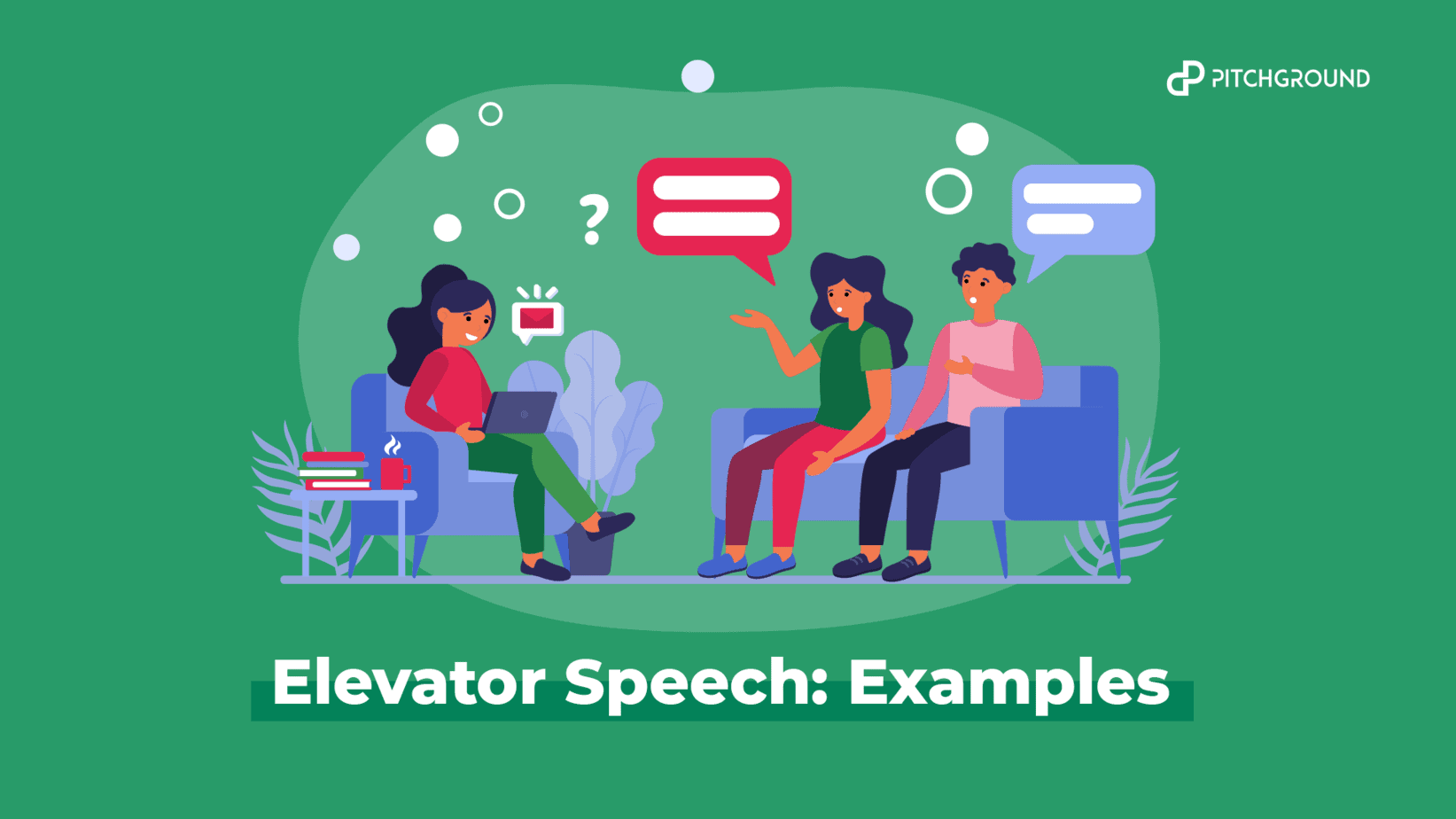Do you struggle with speaking in front of groups?
Elevator speech can be intimidating. Whether you’re looking for a job or just want to speak confidently in public, elevator speech gives you the tools you need to get through any presentation with ease.
Get your elevator speech down pat before you give your first presentation. Use our sample speeches to help you learn the basics and practice until you feel comfortable delivering your best pitch.
How often does someone ask you to write them an elevator speech or pitch? It seems that everyone wants to know what they should say in their next job interview.
An elevator speech is a simple description of your professional background that lets the person standing below you know why they should hire you.
Whether you’re applying for a new position or pitching a client on a project, an elevator speech can boost your chances of landing the gig and closing the deal.
An elevator speech is a great way to introduce yourself to potential employers. But it’s not only useful when looking for a job – we use elevator speeches all the time when pitching clients, talking about sales, giving presentations, and more.
So whether you’re considering a career change or trying to convince someone else to work with you, this guide will show you how to create a winning elevator speech.
This guide is split into two parts: getting started and practicing. First, let’s talk about where to start when crafting your elevator speech.
In the end, you’ll have a clear understanding of what makes you unique as a candidate and what differentiates you from other professionals who are also interested in the same role.
And once you’ve got that perfect elevator speech, make sure to practice! We’ll dive into how you can build up a strong foundation for your pitch.
Statistics
- Keep your elevator pitch goal-oriented (i.e., “I help companies like yours increase production by up to 30% without additional cost.”), and always end with a business card or request to connect on LinkedIn. (blog.hubspot.com)
What is an Elevator Speech?

The term “elevator speech” refers to a short summary of your skills and accomplishments.
For instance, if you were asked to describe yourself in one sentence, it would likely be something like, “I am a highly-skilled engineer, and I love working on challenging problems.”
An elevator speech would be shorter than that but still convey similar information.
It is important to note that an elevator speech is quite different from a sales pitch. A sales pitch is designed to persuade the listener to buy something. In contrast, an elevator speech is meant to sell the listener on hiring you.
Elevator speeches are used for many reasons, but some common uses include:

Introducing Yourself to New People
When you meet new people you don’t know well, you may be asked a lot of questions. To answer those questions, you must first explain what you do. It is where an elevator speech comes in handy.
You can easily share the most important details of your career with anyone you meet since they already know precisely what you do.
Job Interviews
When you’re interviewing for a new position, you’ll usually be asked to tell your story over coffee or lunch multiple times.
While hiring managers want to hear your entire life history, they will typically focus on your resume during your initial conversation. The key here is to keep things brief.
Your pitch should be less than 20 minutes long, so you have plenty of time to impress them.
Pitching Clients
Once you get past the initial introduction stage of selling a client on a project or proposal, you need to find a concise way to summarize everything you did while working together.
If you’re meeting with a group of stakeholders, you may present your elevator speech to everyone at once or give each stakeholder their own copy of your presentation. Either way, you’ll need to stick to your script to avoid confusing them.
Presentations
Presenters often include an elevator speech in their introductions before presenting their content. Based on their audience, these speakers tend to think about what they want to say and then choose which slides to focus on.
They might mention that they are using a PowerPoint deck, list out the main points, and then spend the rest of their time talking about each slide’s content.
If you follow this pattern, you could use your elevator speech as a framework for your presentation.
Why are they Important?

A good elevator pitch is one of the most important communication tools you possess.
An effective elevator pitch helps you sell yourself quickly and effectively to potential clients.
It allows you to introduce yourself and your business in a short amount of time. And it gives you the chance to persuade potential clients to hire you.
Elevator pitches are used in many different situations, such as networking events, job interviews, conferences, and sales calls.
Elevator pitches don’t always require exchanging money between parties — sometimes, they’re simply used as a conversation starter.
But regardless of whether there’s any financial exchange involved, it’s still possible to craft a powerful elevator pitch.
Here’s what you need to do:
• Write down 3-7 sentences about your product/service. Include details that make your product unique or stand out.
• Think about how you’d describe your product/business in three words.
• Practice delivering each sentence aloud.
• Use the phrase “I’m a” after each sentence. For example, I’m a graphic designer, I’m a professional speaker, I’m a business consultant.
• Add a positive emotion into each sentence. For example: “I’m passionate about helping people,” “I’m an expert in my field,” “My products are affordable.”
• Find examples of successful elevator pitches. Study their content and delivery style. Then use these ideas and create your own elevator pitch.
• Be specific. Avoid vague statements like “I’m a…” If you say you’re a writer, explain what kind of writing you write. If you say you’re an accountant, let us know what kind of accounting services you provide.
• Don’t forget to include your website address in the elevator pitch. This way, a person who reads the pitch online can contact you later and learn more about you.
• Practice your pitch until it sounds natural and flows well. The more comfortable you become with your pitch, the easier it will be to deliver to others.
When and How to Use an Elevator Speech
Elevator pitches are a great way to get started in your job search. Use them when meeting new people, including potential employer(s), or when making introductions.
Also, try using them when attending social gatherings, networking event(s), career fairs, or even just walking through a store. Try starting conversations by saying something like, “Hi! My name is, and I am an .”
You would then go on to give an elevator pitch about yourself and your company. People may not respond right away, but they’ll probably follow up with questions about your company or about you if they do.
Here are some tips for using an elevator speech:
1. Know What You Want to Say
First, you should know precisely what you want to say. You don’t want to wing it, and you don’t want to ramble.
What do you want to say? Write down your elevator speech first. Then edit and revise until you feel comfortable saying it.
2. Make Sure You Are Prepared
Once you’ve written out your elevator speech, you should practice it. Practice it aloud, then practice it again silently in your head.
Practice makes perfect. And you’ll sound much better when you deliver your speech than if you were winging it.
3. Focus On Your Audience
Next, focus on the person you are speaking to. It means paying attention to what they are doing.
Are they smiling? Are they nodding along? Do they seem interested in what you are saying?
It will give you clues to whether or not you are connecting with your audience. Making eye contact helps too.
4. Be Specific
Be specific about what you want to say, and stick to your point. Don’t ramble or talk too much.
Make sure you are clear, concise, and focused.
Use simple language, and avoid complex words. People won’t understand them.
Keep it simple. Use a metaphor, analogy, or simile if you need to explain something.
6. Speak Clearly
Speak clearly. Be confident.
Don’t stutter or hesitate.
7. Finish Strong
Finish strong. Don’t leave people hanging.
End your speech with a punch line.
8. End With A Question
Ask questions. Ask for feedback.
End your speech by asking if there are any questions.
9. Tell Stories
Tell stories. An engaging speech will do wonders for you.
10. Be Yourself
Be yourself. No one else is better qualified to tell you how to speak.
Remember, you don’t have to be anyone else. Just be you.
How to Create an Elevator Pitch With Examples
Have you ever wondered what makes an effective pitch? Here’s how to create an elevator pitch:
Start by writing down three things about yourself. They could include:
• What do you do?
• Why should I hire you?
• How much money would you expect me to pay you?
Then write out two sentences describing each one of these three topics. For example, here’s how a developer would introduce themselves in an elevator pitch:
I am a web developer who loves creating websites and apps. I enjoy working with clients to develop custom solutions that meet their specific requirements.
My clients appreciate my ability to quickly understand their goals and provide creative solutions to achieve those goals.
As an independent contractor, I charge $50 per hour.
When you have completed your elevator pitch, ask yourself whether it conveys the correct information about yourself and your abilities.
Does it tell people why you are qualified to perform the task at hand? Is it concise and clear? Can you answer any questions that come up after hearing your pitch?
Your elevator pitch doesn’t have to be long.
But your story needs to be compelling enough that someone might actually listen to it.
You could create your own elevator pitch examples or find other examples on the web.
What Not to Say and Do During Your Elevator Speech:

Many people think about what to say when they meet someone for the first time. But what do you really need to say, and what should you avoid saying?
When you’re meeting a new acquaintance for the first time, you’ve probably heard a million things over the years that were supposed to be appropriate for that situation. For example, you may have heard these phrases:
“How was your weekend?”
But what do those phrases actually mean?
Here’s a list of what NOT to say and do during your elevator speech:
1. Don’t ask how someone is doing unless you genuinely care.
It seems obvious, but don’t ask someone how they are doing unless you genuinely care.
That means you don’t ask every person you meet whether their health is okay, nor do you ask everyone you meet if their weekend was good.
Unless you care about how someone else is doing, don’t ask them personal questions.
2. Don’t interrupt someone while they are talking.
Try not to interrupt someone when they are speaking. It shows a lack of respect for the speaker.
It doesn’t mean you shouldn’t offer an opinion or add something to the conversation, but try not to cut someone off mid-sentence.
3. Don’t talk too much yourself.
If you want to speak, wait until the person has finished speaking. Don’t fill up too many minutes of the speaker’s time.
Also, don’t talk about yourself so much that the person feels uncomfortable. Remember that they want to talk to you, not listen to you.
4. Don’t take credit for another person’s success.
Avoid taking credit for another person’s achievements. The other person gets the credit for their own successes. Instead, focus on the fact that you would benefit from the same results.
5. Don’t ask others for advice unless you truly seek it out.
This one sounds simple, but some people still use it. Avoid asking someone for advice unless you really need it.
6. Don’t tell anyone about any problems you may have had in the past.
Most people don’t want to hear about your struggles in life. They don’t want to know about when you didn’t get into college, got fired from your job, or failed your last exam.
7. Don’t complain about how you feel.
It’s essential to learn to accept your life and your circumstances. Complaining about how you feel won’t change anything.
8. Don’t discuss politics or religion.
We live in a politically divided society, and people who believe in different religions often disagree.
So why bring up either subject at a social gathering? Avoid discussing politics and religion whenever possible.
10. Don’t ask others to judge for you.
No matter how much you want to know if you look good or not, no one can make this judgment for you. Don’t ask others if you look good or bad.
11. Don’t criticize others’ appearance.
People understand that you might not like someone’s hairstyle or clothes, but don’t criticize them. Some people wear what makes them happy, and you don’t have to approve of everything they do.
Bottom Line:
Elevator Speeches are essential because they help you connect with new people. But remember that these conversations should be brief. And avoid using specific phrases and words. These will only annoy the person you’re talking to.



